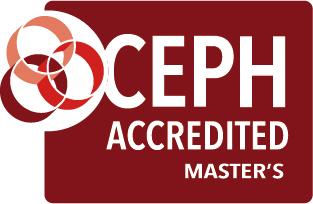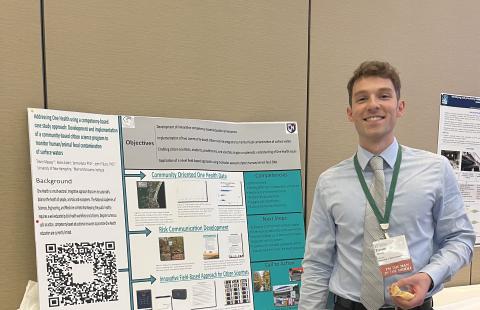WHY GET A MASTER’S DEGREE IN PUBLIC HEALTH?
Public health is a fast-growing field that intersects with many fields and serves as the leading profession for keeping our communities healthier and safer. A Master’s of Public Health (MPH) is one of the top credentials for public health practitioners. From a community health perspective, the MPH coursework lays the foundation to create, implement, and evaluate population-based strategies to study disease, community health needs assessment, and environmental health in ways that improve the public’s health. It prepares graduates to enter multidisciplinary fields with strategies and skills that address a range of problems affecting communities.
WHY CHOOSE UNH’S MASTER OF PUBLIC HEALTH PROGRAM?
The MPH degree at UNH is a generalist degree, accredited by the Council on Education for Public Health (CEPH) that allows students to complete a curriculum focusing on multiple strategies and skills required within the public health field. The program can be completed in as little as five semesters or up to three years. In-person courses are offered in the evening and are designed to accommodate the schedules of working professionals. Additionally, the competitive tuition rate makes the program financially affordable. Through an emphasis on community engagement and hands-on experience, students complete a 100-hour field study and a capstone project allowing them to apply the theory and practice of public health in a real-world setting. To further enhance the MPH, you can also consider combining it with one of UNH’s many graduate certificates.
POTENTIAL CAREER AREAS
- Community health
- Consumer advocacy
- Epidemiology
- Government agencies
- Healthcare data analysis
- Hospital administration
- Managed care
- Pharmaceutical companies
- Public health education
- Public health lab director
From the CHHS Blog
Curriculum & Requirements
The MPH curriculum meets the 22 CEPH accreditation competency requirements. This program can be completed in five semesters, and up to three years. During the final semester of the MPH Program, students complete a 100-hour professional field study experience applying public health principles and standards to professional projects within a public health organization. The final course in the curriculum is the integrating seminar in which students work in teams, bringing both their individual and joint perspectives, as well as their expertise together to address a specific public health problem for a public health institution.
To enter the MPH Program, an applicant must have a baccalaureate degree from an accredited college or university. Applications are accepted for fall and spring semesters. Upon completion of the certificate program, students may apply to the MPH program. If admitted into the MPH program, the certificate credits will be applied to the MPH degree program.
Please visit the Graduate School website for detailed instructions about applying to the graduate certificate program.
Sample Degree Plan
This sample degree plan serves as a general guide; students collaborate with their academic advisor to develop a personalized degree plan to meet their academic goals and program requirements.
| First Year | Credits | |
|---|---|---|
| Term 1 | ||
| PHP 900 | Public Health Care Systems | 3 |
| PHP 901 | Epidemiology | 3 |
| PHP 902 | Environmental Health | 3 |
| Term 2 | ||
| PHP 903 | Biostatistics | 3 |
| PHP 904 | Social and Behavioral Health | 3 |
| PHP 905 | Public Health Administration | 3 |
| Term 3 | ||
| PHP 906 | Public Health Finance and Budgeting | 3 |
| PHP 907 | Public Health Policy | 3 |
| PHP 908 | Public Health Ethics | 3 |
| Term 4 | ||
| PHP 912 | Public Health Law and Negotiation | 3 |
| PHP 922 | Public Health Economics | 3 |
| PHP 926 | Evaluation in Public Health | 3 |
| Term 5 | ||
| PHP 990 | Field Study | 3 |
| PHP 998 | Integrating Seminar | 3 |
| Credits | 42 | |
| Total Credits | 42 | |
Degree Requirements
The program requires 14 courses, (42 credits).
| Code | Title | Credits |
|---|---|---|
| Required Courses | ||
| PHP 900 | Public Health Care Systems | 3 |
| PHP 901 | Epidemiology | 3 |
| PHP 902 | Environmental Health | 3 |
| PHP 903 | Biostatistics | 3 |
| PHP 904 | Social and Behavioral Health | 3 |
| PHP 905 | Public Health Administration | 3 |
| PHP 906 | Public Health Finance and Budgeting | 3 |
| PHP 907 | Public Health Policy | 3 |
| PHP 908 | Public Health Ethics | 3 |
| PHP 912 | Public Health Law and Negotiation | 3 |
| PHP 922 | Public Health Economics | 3 |
| PHP 926 | Evaluation in Public Health | 3 |
| PHP 990 | Field Study | 3 |
| PHP 998 | Integrating Seminar | 3 |
| Total Credits | 42 | |
Grading Policy: For the purposes of determining academic standing, grades below the “B-” level in graded courses are considered failing grades. The MPH program director will recommend dismissal of a student to the Graduate School when a failing grade occurs in six or more credits, either in two courses or in one course taken twice. Repeating a course does not remove the original failing grade from the record. Students must have a cumulative grade point average of 3.0 (B), or higher, in order to graduate. Students admitted on a conditional or provisional basis must meet the conditions or provisions as stated in the letter of admission in order to remain in the Graduate School.
Program Learning Outcomes
CEPH Foundational Competencies:
Evidenced-based Approaches to Public Health
- Apply epidemiological methods to the breadth of settings and situations in public health practice.
- Select quantitative and qualitative data collection methods appropriate for a given public health context.
- Analyze quantitative and qualitative data using biostatistics, informatics, computer-based programming and software, as appropriate.
- Interpret results of data analysis for public health research, policy or practice.
Public Health and Health Care Systems
- Compare the organization, structure, and function of health care, public health, and regulatory systems across national and international settings.
- Discuss the means by which structural bias, social inequities and racism undermine health and create challenges to achieving health equity at organizational, community and societal levels.
Planning and Management to Promote Health
- Assess population needs, assets and capacities that affect communities’ health.
- Apply awareness of cultural values and practices to the design or implementation of public health policies or programs.
- Design a population-based policy, program, project or intervention.
- Explain basic principles and tools of budget and resource management.
- Select methods to evaluate public health programs.
Policy in Public Health
- Discuss multiple dimensions of the policy-making process, including the roles of ethics and evidence
- Propose strategies to identify stakeholders and build coalitions and partnerships for influencing public health outcomes
- Advocate for political, social or economic policies and programs that will improve health in diverse populations
- Evaluate policies for their impact on public health and health equity.
Leadership
- Apply principles of leadership, governance and management, which include: creating a vision, empowering others, fostering collaboration and guiding decision-making.
- Apply negotiation and mediation skills to address organizational or community challenges.
Communication
- Select communication strategies for different audiences and sectors.
- Communicate audience-appropriate (i.e., non-academic, non-peer audience) public health content, both in writing and through oral presentation
- Describe the importance of cultural competence in communicating public health content.
Interprofessional and/or Intersectorial Practice
- Integrate perspectives from other sectors and/or professions to promote and advance population health.
Systems Thinking
- Apply a systems thinking tool to visually represent a public health issue in a format other than standard narrative.
UNH Master of Public Health Program Competencies
- Use innovative problem-solving to impact complex public health issues.
- Strengthen leadership skills through reflection and observation to identify areas for personal and professional growth.
- Analyze the impact of determinants of health on public health issues using a social ecological framework.
- Apply basic principles of ethical analysis to improve health equity and policy relevance.
- Incorporate relevant theories to inform and create public health interventions.
Deadlines
Applications must be completed by the following deadlines in order to be reviewed for admission:
- Fall: July 1
- Spring: N/A
- Summer: N/A
- Special: N/A
Campus: Durham
Application fee: $65
New England Regional: RI VT
Accelerated Masters Eligible: No
New Hampshire Residents
Students claiming in-state residency must also submit a Proof of Residence Form. This form is not required to complete your application, but you will need to submit it after you are offered admission, or you will not be able to register for classes.
Transcripts
If you attended UNH or Granite State College (GSC) after September 1, 1991, and have indicated so on your online application, we will retrieve your transcript internally; this includes UNH-Durham, UNH-Manchester, UNH Non-Degree work and GSC.
If you did not attend UNH, or attended prior to September 1, 1991, then you must upload a copy (PDF) of your transcript in the application form. International transcripts must be translated into English.
If admitted, you must then request an official transcript be sent directly to our office from the Registrar's Office of each college/university attended. We accept transcripts both electronically and in hard copy:
- Electronic Transcripts: Please have your institution send the transcript directly to grad.school@unh.edu. Please note that we can only accept copies sent directly from the institution.
- Paper Transcripts: Please send hard copies of transcripts to: UNH Graduate School, Thompson Hall- 105 Main Street, Durham, NH 03824. You may request transcripts be sent to us directly from the institution or you may send them yourself as long as they remain sealed in the original university envelope.
Transcripts from all previous post-secondary institutions must be submitted and applicants must disclose any previous academic or disciplinary sanctions that resulted in their temporary or permanent separation from a previous post-secondary institution. If it is found that previous academic or disciplinary separations were not disclosed, applicants may face denial and admitted students may face dismissal from their academic program.
Letters of recommendation: 3 required
Recommendation letters submitted by relatives or friends, as well as letters older than one year, will not be accepted.
Personal Statement
Applicants are required to submit a narrative which addresses five questions. Please submit an answer to each question separately in 250 words or less: Download Special Essay Questions.
Statements must be included with your submitted application.
Resume
A current resume is required with your submitted application.
Important Notes
All applicants are encouraged to contact programs directly to discuss program-specific application questions.
International Applicants
Prospective international students are required to submit TOEFL, IELTS, or equivalent examination scores. English Language Exams may be waived if English is your first language. If you wish to request a waiver, then please visit our Test Scores webpage for more information.
Explore Program Details
The UNH Public Health program has held accreditation from the Council on Education for Public Health (CEPH) since 2003 and is accredited through July 1, 2027.
For more information please see CEPH Procedures
Self-study Report for Accreditation

The UNH MPH and PHC Programs are designed to provide current and aspiring public health professionals with the core competencies needed to be an effective public health professional. Key strengths of our Program include:
- Quality faculty – faculty come from a range of public health practice settings (academic, private, governmental) and bring their knowledge and “real world” experiences to the classroom.
- Applied Focus – Coursework focuses on the application of knowledge to the “real world” of public health practice
Small class sizes
1. What career possibilities are there in public health?
Since public health is a multi-disciplinary field, the range of potential employment settings and job titles varies tremendously. Examples of settings employing public health professionals include: hospital, clinics and other service provision agencies; federal, state and local governmental agencies; insurance companies & managed care organizations; pharmaceutical companies, pharmacies, and labs; consulting firms; colleges & universities; consumer advocacy; and relief agencies. Examples of the vast array of public health job titles include: Public Health Laboratory Director, Hospital Administrator, Health Educator, Community/Public Health Nurse, Environmental Health Sanitarian, Health Planner, Epidemiologist, Data Analyst, and Public/Community Health Program Manager.
2. Obtaining my MPH degree is my starting point into a career in public health. Can I still apply to the Program given I have no direct public health work experience?
Yes, you can still apply to the Program. However, since our program is offered in the evenings we highly encourage you to investigate obtaining a paid or unpaid position to gain simultaneous direct work experience in public health. This type of experience provides a valuable context for your MPH coursework. In terms of your application to the Program, we invite students to highlight the transferable skills brought from previous paid and volunteer experiences, as well as public health career interests/aspirations.
3. I am an international student interested in applying to your Program. Am I eligible to apply?
The answer depends on the requirements of the visa you would be using to study in the U.S. Student visas (including F-1 and J-1 visas) require attendance in a full-time program. If you have questions about whether your visa allows for study in a part-time program, please contact an admissions counselor at the UNH Graduate School at (603) 862-3000.
4. How do I determine if the MPH or Public Health Certificate (PHC) is appropriate for me?
This decision depends on several different factors. First and foremost, what is your goal? If your goal is to be the director of a public health agency or conduct public health research, then the MPH degree makes most sense. If your goal is to have a better base-level understanding about public health, then a PHC may be for you. Second, based on your current life/family obligations, is a two-year or one year program more feasible? Lastly, some students choose to start with the PHC program, knowing that their long-term goal is obtaining an MPH degree. For these students, having a mid-process milestone that they can put on their resume is attractive.
5. What are the career possibilities/potential with a Public Health Certificate versus an MPH?
The answer to this question depends on the position. If a position requires an MPH degree, then having a PHC does not meet the requirement. However, if the position does not require an MPH, then having a PHC may provide sufficient public health background to be considered for the position.
6. Can you give me some examples of typical assignments?
Professors use a wide range of assignments to support student learning. These include: tests, papers, presentations, essays, case studies, projects, and posters.
7. What is your policy about transferring credits?
MPH Students are allowed to transfer in up to 8 GRADUATE LEVEL credits. These credits MUST have been taken in the past five years, come from an accredited educational institution, and be approved by the MPH Program Coordinator. In addition, a grade of “B” or better must have been received. Graduate courses cannot be transferred for graduate credit if used in completing another graduate degree. Credits transfer into UNH on an equivocal basis, hence if you took a 2 credit graduate level course, it would transfer in as 2 credits.
All courses for the Public Health Certificate MUST be completed at UNH.
8. Can I "test the waters" and take a few courses before applying to the MPH or PHC Program?
Yes, you can. Students can take up to two courses before applying to the MPH Program. Those interested in the Public Health Certificate can take one course before applying. In order to register for a course, prior approval from the MPH Program Director is required. To register for a course, either register in person by going to the Student Services Suite at University Center, UNH Manchester, 88 Commercial Street, Second Floor or call the Registration Office at (603) 641-4136.
Title: Developing an educational library of public health information for residents and local business to keep them informed and empowered on by-laws and local regulations
Organization: Town of Westford Health Department, Westford MA
Mentor: Sandy Collins, R.N., Health Director
Summary: The health department is responsible for enforcing policy enacted by the Westford Board of Health and as a result, department employees are called upon to provide guidance on how to comply with town bylaws and local regulations. The goal of this project is to review and interpret the newly amended hazardous materials storage bylaw and develop a clear and concise training program that allows local businesses to understand their role in managing hazardous materials safely and in accordance with local regulations. Additionally, this project allows for the expansion of education materials which the town can use to educate the public and local business on a range of other public health topics, such as nail salon safety, demolition activities, well testing and healthy lakes and ponds education.
Title: Workplace Best Practices for Tickborne Illness Prevention
Organizations: Occupational Health Surveillance Program, Institute on Disability, UNH
Environmental Public Health Tracking, Division of Public Health Services, NH DHHS
Mentors: Karla Armenti, Principal Investigator (OHSP) :Kathleen Bush, Program Manager (EPHT)
Summary: Tick bites and tick borne illnesses, most notably Lyme disease, are a growing public health threat of particular concern in the northeast region of the United States. Workers that engage in fieldwork and other outdoor activities are at an increased risk of tick bites. The objective of this project is to collect information on current policies and practices related to tickborne illness prevention in the workplace among New Hampshire State Agencies. Ultimately, analysis of this information will be integrated into recommendations for best practices for occupational prevention strategies.
Title: Needle Disposal Community Guide
Organization: Department of Public Health and Community Services- Nashua, NH
Mentor: Beverly Doolan, Program Coordinator/Grants manager
Summary: This project focuses on the development of a community guide for the Nashua area that provides information on proper needle disposal techniques. Proper needle disposal is important to practice for both environmental reasons and for the protection of waste disposal workers and volunteers who do community clean ups. The objective is to provide educational tools for local community partners to distribute to Nashua citizens that may use medical sharps or have a family member/friend who uses sharps. The creation of the community guide involved surveying, data analysis, research, and developing health education materials.
Title: NH Comprehensive Cancer Collaboration White Paper: A Project Supervised by the NH Institute of Disability
Organization: NH Institute on Disability, UNH
Mentor: Kimberly Phillips, Project Director, Co-Chair of Equity Task Force
Summary: This project focuses on the breast, cervical and colon cancer screening rates in New Hampshire among social disparities including those with disabilities, those who are non-white and those who live in poverty. The equity task force will also strive to develop an intervention which will effectively increase rates. The objective of this project is to develop a final white paper which gives an overview of relevant data sets, a description of the team's progress, suggestions for improvements and the future plans of the collaboration.
Title: Factors that May Influence HIV Medication Adherence in Sexually Abused Women
Organization: Northeastern University, Boston, Massachusetts
Mentor: Meredith Scannell, MPH, RN, NP, PhD(c)
Summary: The projects focus is to identify socio-ecological factors (individual level) that may influence nPEP (HIV medication) adherence and their follow-up compliance. This research study will help contribute to a gap in the literature on lack of information on why women throughout Massachusetts who have been sexually assaulted do not adhere or complete nPEP. As a result, this could help with specific interventions on our targeted population.
Title: Importation of dogs and cats into NH: A zoonotic disease risk assessment of pet rescue activity
Organization: NH Dept. of Agriculture, Markets, and Food: Division of Animal Industry
Mentor: Steve Crawford, DVM; NH State Veterinarian and Deputy Commissioner of the Division of Animal Industry
Summary: There is high demand and limited supply of adoptable pets in New England animal shelters, whereas many southern shelters must euthanize a high proportion of animals. This imbalance has created a market for the importation of pets from south to north. There are concerns that pets imported for this purpose may carry infectious and zoonotic disease, although the true risks surrounding pet importation have not been quantified. This project focuses on the presence of zoonotic and other infectious disease in pets transported into NH for adoption. The objective of this project is to assess disease rates in both imported and local pet populations by summarizing state veterinary office records and by designing, conducting, and analyzing a survey of NH veterinarians. This information will guide future dog importation regulations in NH.
Title: Advocating for Effective Policies and Evidence-Based Programs to Prevent and Address Sexual and Intimate Partner Violence at Institutions of Higher Education
Organization: Prevention Innovations Research Center, UNH
Mentors: Sharyn J. Potter, Ph.D., M.P.H. and Jane Stapleton, M.A.- Co-Directors of Prevention Innovations Research Center
Summary: In recent years the media has exposed how institutions of higher education struggle to address college campus sexual and intimate partner violence. Sexual and intimate partner violence affects student victim’s educational experience and health outcomes as well as affecting the social cohesion of campus communities. Further, institutions of higher education continue to struggle to be in compliance with Title IX and the Clery Act and applicable U.S. Department of Education regulations and guidance. This project seeks to explain basic requirements of Title IX and the Clery Act and advocate for the use of effective polices and evidence-based practices to prevent and improve the response to sexual and intimate partner violence at institutions of higher education.
Title: Measuring Community Wellbeing and its Determinants
Organization: National Committee on Vital Statistics Subcommittee on Population Health
Mentor: Gib Parrish, MD, Consultant to National Committee on Vital Statistics Subcommittee on Population Health, US DHHS
Summary: This project will serve to inform a proposal for a roadmap for HHS to identify measures of community well-being and its determinants across all essential domains that will work at various geographic levels from neighborhood to the nation, and that will enable partnerships among sectors at all geographic levels. The project work will combine a theoretical review of existing measures of community vitality with application of measures to a New Hampshire community. Final output of this project will include recommendations for 10 to 12 domains to be included in the proposal.
Title: Improving Nutrition and Physical Activity Environment in Childcare
Organization: UNH Cooperative Extension, Durham, NH
Mentor: Debbie Luppold, Extension Professor/Specialist: Food and Nutrition, RD,LD
Summary: This project focuses on improving the health of young children in childcare settings. In the United States, childhood obesity has doubled in the past thirty years.1 Currently, 1 in 5 children are categorized as overweight and 17% of children are categorized as obese.1 The goal of this project is to ensure that childcare centers have policies in place regarding nutrition and physical activity to help improve rates of childhood overweightness, obesity and overall health and wellness. The objectives of this project are to assess what policies childcare centers currently have surrounding nutrition and physical activity, if any, and provide those childcare centers suggestions on policies to implement, policies to edit and a plan to try and put those edits or policies in place.
Title: Breastfeeding and Work Survey Project
Field Placement Organization: NH Occupational Health Surveillance Program/WIC Breastfeeding/Nutrition Services Section, Division of Public Health Services
Mentors: Karla Armenti, Ms, ScD, Principal Investigator/Program Manager; Lissa Sirois, RD, IBCLC WIC Breastfeeding Coordinator
Summary: Breastfeeding rates for working mothers in New Hampshire need improvement. The overall objective of the pilot study is to better understand the barriers to women breastfeeding after childbirth, particularly focused on workplace policies and support practices that encourage or discourage breastfeeding after returning to work while working with the Maternal and Child Health Section, WIC, and the NH Breastfeeding Task Force. My involvement in the five year study is to participate in early survey development for WIC mothers. The survey will help determine current barriers WIC mothers have while breastfeeding. Initial survey development will determine if the survey is effective in meeting project goals. In the future, this pilot study may help to influence NH policy on worksite breastfeeding practices.














